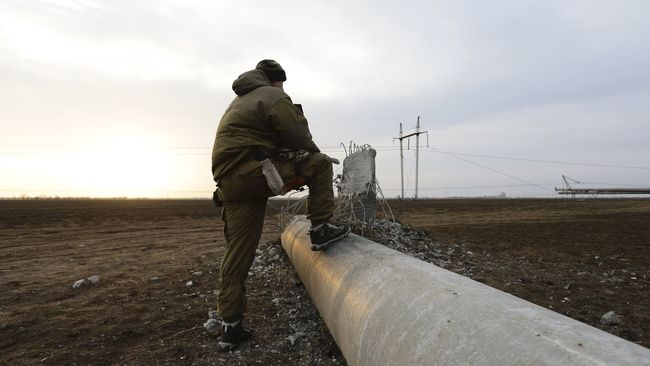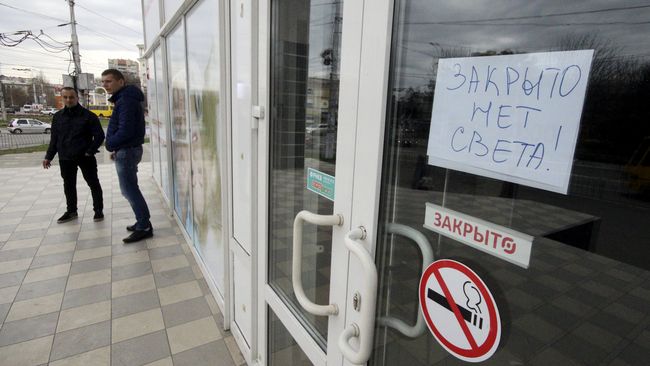Without power supply
Expert: “Our task is to make the price of occupation of our soil too high”
Cutting power supply to Crimea could not fail to cause a lot of speculation. Once again, we are hearing the word “blockade” being used, which was imprudently introduced past year, when Russia occupied part of the Donbas following the annexation of Crimea. The term was then picked up by Russian propaganda outlets, which turned the situation upside down, alluding to “besieged Leningrad” which fitted so well with their stock condemnations of “Banderaites” and “fascists.” Misunderstanding was worsened by a strange policy of the Ukrainian side regarding the definition of what was happening in relations with Russia. Since the beginning of the neighbor’s military aggression, the government of Ukraine has not only been afraid to declare a state of emergency in some areas of our country that would make it possible to dot some i’s in the definitions, but it has not even used the term “war,” limiting it to the ATO (anti-terrorist operation) acronym. Moreover, even during hostilities, we still see continued, and sometimes murky, dealings with the occupied territories, just as bouts of hysteria about the “blockade” of Ukrainian citizens keep occurring from time to time. No blockade has been instituted, as shown by the abundant presence of Ukrainian goods in the Donbas and Crimea. It happened so that the word “smuggling” (another unfair term which can only be used in relations between the countries, and not with the occupied lands) began to be used to label trucks with foodstuffs, but not trains with coal. All these circumstances hinted that the war had become a profitable enterprise for some. This, of course, does not fit with the objectives of liberation. So, if someone lit the lights in Crimea, it benefited someone. Some people are satisfied with the current status of the occupied territories, while the passivity of the Ukrainian authorities eventually led to the signing of the clearly losing Minsk 2 scenario and planted the seeds of evident weariness of the international community as it tried in vain to understand Ukraine’s actions. After all, Europe has many issues of its own that need immediate solutions, and it has no time to solve confused tangles of Ukrainian-Russian relations.

NOTICE READS: “CLOSED. THERE IS NO POWER SUPPLY” / REUTERS photo
The “blockade” of Crimea was lately used by some as an element of a PR drive before the elections. We should not forget, though, that whoever uses these processes for their own political ends, the society does contain powerful active element that seeks drastic and often radical actions. If politicians refuse to be statesmen, citizens will try to take over this role, just like during the Euromaidan. Still, effectiveness of such actions remains questionable. After all, when people begin to assume the function of the state, no coherent strategy is on offer. For example, the international media repeatedly used the word “terrorist attack” when talking about the power line accident. Meanwhile, the UN in the person of its Secretary-General Ban Ki-moon openly hinted that Vladimir Putin had to play a leading role in the fight against terrorism. While these were seemingly unrelated media messages, they did create a disadvantageous environment for Ukraine. It is clear that Putin will use the said accident to create a proper image of “besieged Crimea” and evil “Banderaites” who hate Crimeans. In this effort, he will find help not so much from Ukrainian partisans as from fickle policies of the Ukrainian government, which seems to reside in a parallel reality, because we see once again the much-discussed question raised: are we fighting or trading?
Andrii SENCHENKO, MP of the 5th, 6th, and 7th convocations of the Verkhovna Rada:
“The main question is whether the government is going to do anything at all to fight for the integrity of the country. This applies to both Crimea and the Donbas. The citizens have now reasonable doubts about the intentions of the authorities. There is the impression that top Ukrainian officials would with great pleasure rule a rump Ukraine without Crimea and the Donbas, as long as they are left alone. Therefore, the public is beginning to assume the burden of restoring the nation’s territorial integrity. What we see now is something similar to what happened in the spring of 2014, when there was no government, no army, and no security services. It was volunteers, both armed and civilian, who undertook to defend the country then. All this is being repeated now, even though we have the government, army, and security services, which in fact should do it. That is why there was an initiative on goods blockade of Crimea at first, launched by the Mejlis of the Crimean Tatar People and joined by various organizations later on. I see what happened to pylons as the beginning of the guerrilla war for independence of Ukraine. It will have to be guerrilla precisely because the authorities do not want to defend the country.
“In my opinion, such a blockade is definitely needed. We have a fairly large range of tools to influence the occupier. Military efforts mean the loss of human lives. In addition to military means, we have means of diplomatic nature at our disposal, but the Minsk agreements are clearly not among them. The third way is that of legal efforts, which the government was very passive on. Pitiful attempts to bring the case to the European Court of Human Rights cannot be considered a true legal fight for the protection of our country. They have more to do with PR. The fourth way is economic pressure. Its task is to make the price of occupation too high for Russia. The Geneva Convention of 1949 clearly specifies that the maintenance of vital services in the occupied territory rests with the occupation authorities.”
“The Crimea blockade began much earlier than the goods blockade, instituted on September 20. It started a year and a half ago, when we blocked the water supply through the North Crimean Canal. This was done in a planned, neat, and effective manner. Subsequently, it was decided to close ports and airports. The government did nothing for a year and a half after that. The trade started, and it turned out that the government valued Crimea and the Donbas less than income from shadow trade with the occupied territories. In due time, the shameful law on free economic zone in Crimea, which protected such trade, was passed. The people could not tolerate it anymore. The purpose of the blockade is not the creation of shortages. Russia is definitely able to deliver food there. However, this will cost Russia dearly, and thus significantly increase the occupation price.
“As for electricity, it should be delivered in volumes just enough to cover the needs of the population. Ukraine has signed a contract to supply power to the so-called Crimean Federal District, which is a crime for which some our officials should be jailed. In fact, Ukraine supplied more power to Russian military units than to Crimeans, and thus greatly aided the occupiers’ hold on the territory.
“A temporary scheme of power supply is in operation now. I recall that when we had to provide water to Skadovsk district but refuse it to the occupiers, we built a dam in weeks. That is, all issues are solvable, and it is not worth paying attention to speculations that such a blockade hurts us as well. It is enough to get another transformer online to solve the issues in the free territory. It meets resistance, because some people profited from the power supply to Crimea every day, and these profiteers sat in Bankova and Hrushevskoho streets [where the offices of Ukrainian president and Cabinet are. – Ed.], not in some less prominent place.”
Newspaper output №:
№69, (2015)Section
Day After Day





